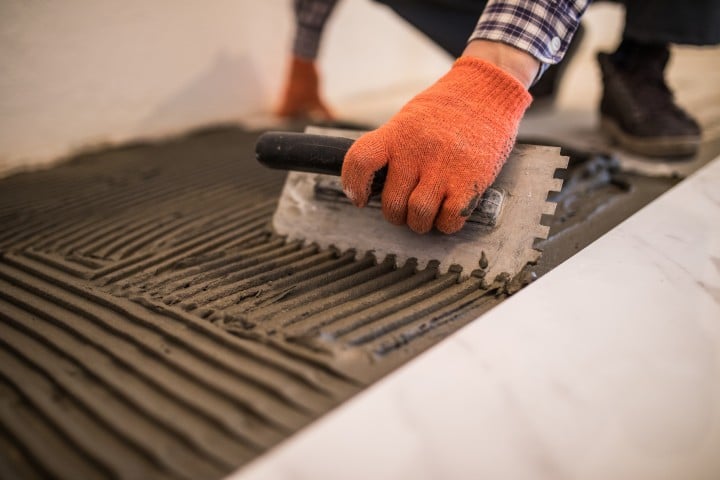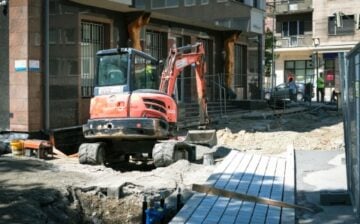Choosing the right industrial flooring has many implications for the safety of the workplace as well as the productivity of the employees. Industrial flooring has to be very heavy duty as heavy machinery and packages are moved on the floor in the course of a single day. This type of flooring is held to a much higher standard than residential or commercial flooring where such operations generally do not happen very often.

Choose Right For Safety
There are many key reasons why choosing the right industrial flooring option can make all the difference. Firstly, the right kind of industrial flooring means that people, cargo and machinery can move easily and efficiently over the floor. Industrial floors should ideally be easy to keep clean due to the surface area so choosing a material that gathers less dust and grime is essential.
Secondly, a non-slip floor is of the utmost importance since companies can get sued if they do not take adequate measures to protect their workers and employees from injury. No probable cause should be noted by an employee or worker as it can later be presented as negligence. Lastly, industrial floors should be very resilient and durable so weight, chemical spillage or other forms of daily wear and tear do not damage them significantly which can result in work slowing down or costly replacements.
Types Of Factory/ Industrial Flooring
The types of factory flooring that are most commonly utilized are acid-proof and heavy duty in nature. This implies that they can stand abrasive chemicals as well as considerable weight on top without crumbling or getting severely damaged. To this end, many different materials may be used for the most effective kind of industrial flooring.
- Concrete flooring is the most used choice as far as industrial flooring is concerned. For obvious reasons concrete is a very durable and relatively unbreakable material. Concrete floors are very durable and nearly impossible to scratch or damage and they can be layered (the concrete can be added in layers for thickness and greater durability) to further maximize their effectiveness for factory flooring. Polished concrete can look quite beautiful and due to its super smooth finish it is easy to clean and mop. Concrete also stays relatively cool so it can provide a comfortable environment where machines generate a lot of heat. Vehicles, machinery and heavy cargo can move on a concrete floor with ease which is why it is used in factories, airports and many other places.
- Epoxy flooring is another excellent choice for factory or industrial flooring. It provides unparalleled resistance to chemicals and oils as well as heavy weights. Epoxy flooring is mostly preferred for food and beverage producing factories or for chemical factories. It exudes a shine and its smooth texture makes it easy to shine and clean. Epoxy flooring can be installed in many colors and is therefore an aesthetic choice as well for more fashionable factories. Its resistance to chemicals and corrosion mean it can be used potentially for decades without any significant damage or costs incurred.
Choosing According To Industry Type
A lot depends on the type of industry or factory you want industrial flooring solutions for. Car or machinery dealerships can benefit from the wonderful shine of epoxy flooring and aviation hangers usually use concrete as it can withstand an incredible amount of weight. For food preparation factories epoxy flooring is widely preferred as it is easier to wipe out stains and spillages and it can be more hygienic. In general for industrial purposes both epoxy and concrete work very well and tick a lot of boxes from durability to ease of maintenance.
Polyurethane Flooring
In industrial applications where there might be a lot of drilling or movement, sometimes polyurethane flooring is a better option than epoxy flooring as it can handle thermal shocks or earthquake related shocks. Polyurethane also has a tried and tested greater durability than epoxy especially if an industrial complex is going to be subject to very high, scorching temperatures. With polyurethane you can get more leeway in these situations than epoxy or concrete flooring.
Rubber
Rubber flooring is very similar in terms of purpose and application to polyurethane as it can also withstand thermal shocks very well. It is pliable and yet quite durable in terms of chemical exposure and spillages which can often happen in an industrial setting. Rubber flooring is available in the form of floor tiles therefore it is easy to pinpoint damaged ones and replace them if the need should arise.
Conclusion
Industrial flooring solutions are decided by weighing a plethora of factors together in order to make the appropriate choice for the longevity and better performance of any industrial space. Professionals should always be consulted before a large-scale investment is made to this effect.
We hope you found this blog post on The Ultimate Guide To Industrial Flooring Solutions, useful. Be sure to check out our post on Ideas for Instantly Updating a Home with New Flooring for more great tips!
Have Experience in the Moving Industry? Want an Additional Income Stream? Work With All Around Moving!
Earn extra income while applying your moving expertise. We’ll be there for you every step of the way. Click here to learn more.





